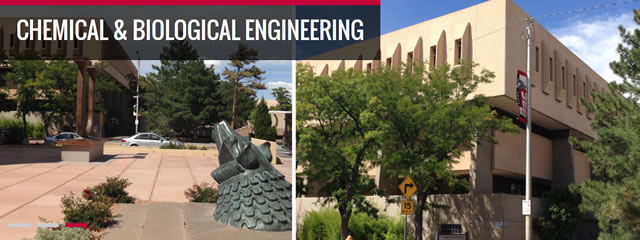
Chemical and Biological Engineering ETDs
Publication Date
8-31-2011
Abstract
Alcohol steam reforming is a promising source of hydrogen as fuel, and could be improved by the use of an optimal catalyst. The methanol steam reforming reaction, CH3OH+H2O --> 3H2+CO2 frequently conducted by means of a Cu/ZnO catalyst. Unfortunately, this catalyst deactivates quickly and is pyrophoric. Pd catalysts are much more stable, but reactions using these catalyst follow the decomposition pathway, CH3OH --> 2H2+CO. PdZn alloys can achieve the desired selectivity, and have been noted to form under reaction conditions from Pd/ZnO heterogeneous catalysts. In the present work, careful synthesis techniques of specific support and nanoparticle surfaces have been developed to gain a better understanding of the interaction between each phase. Synthesis focused on preferential exposure of the most active surface of each material. In the case of ZnO, the polar facets of the crystallite were desirable. These high-energy surfaces are less commonly exposed than non-polar facets in typical powders. Tailored platelet shapes were produced in solution by restricting the growth along the (0001) direction, producing thin crystallites. The surfaces of these crystallites were primarily (0001) surfaces, and \\emph{en masse} constituted a high surface area powder, ideal for use as a catalyst support. For the Pd nanoparticle phase, small particles are necessary for high activity. Synthetic techniques to produce nanoparticles typically use organic capping material, which was shown here to be detrimental to the overall activity. A simpler technique was developed in which methanol was used to reduce a Pd precursor in solution without capping agents. This method was effective when depositing Pd on carbon, and has been shown to be strongly dependent on surface chemistry when used with oxide supports. By manipulating the oxide surface with simple solvents, this technique has been generalized for the synthesis of supported nanoparticle catalysts.
Keywords
Pd, ZnO, nanoparticles, Methanol Steam Reforming, acetylene hydrogenation
Sponsors
My research has been supported by the United States Department of Energy, Office of Basic Energy Sciences under contract number DE-FG02-05ER15712, and the Partnership for International Research and Education (PIRE) under the National Science Foundation, grant number OISE 0730277. The research conducted has been augmented by the electron microscopy facilities at the University of New Mexico which are supported by the NSF EPSCOR and NSF NNIN grants.
Document Type
Dissertation
Language
English
Degree Name
Chemical Engineering
Level of Degree
Doctoral
Department Name
Chemical and Biological Engineering
First Committee Member (Chair)
Boyle, Timothy J.
Second Committee Member
Petsev, Dimiter
Third Committee Member
Kemp, Richard
Recommended Citation
Burton, Patrick David. "Novel routes for synthesis of Pd nanoparticles and faceted ZnO supports for heterogeneous catalysts." (2011). https://digitalrepository.unm.edu/cbe_etds/11
